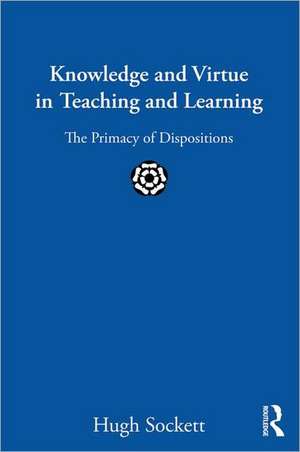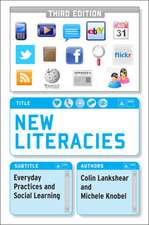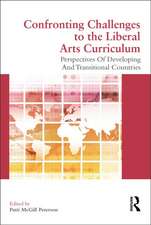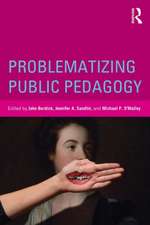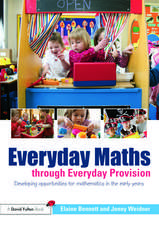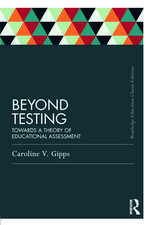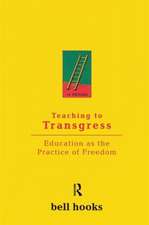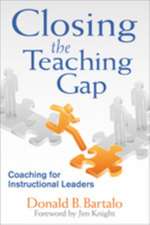Knowledge and Virtue in Teaching and Learning: The Primacy of Dispositions
Autor Hugh Socketten Limba Engleză Paperback – 10 noi 2011
It offers a powerful example of how philosophy of education can be brought to bear on real problems of educational research and practice – pointing the reader to re-envision what it means to educate children (and how we might prepare teachers to take on such a role) by developing the person, instead of simply knowledge and skills. Connected intimately to the practice of teaching and teacher education, the book sets forth an alternative theory of education where the developing person is at the center of education set in a moral space and a political order. To this end, a framework of public and personal knowledge forms the content, to which personal dispositions are integral, not peripheral.
The book’s pedagogy is invitational, welcoming its readers as companions in inquiry and thought about the moral aspects of what we teach as knowledge.
| Toate formatele și edițiile | Preț | Express |
|---|---|---|
| Paperback (1) | 349.34 lei 6-8 săpt. | |
| Taylor & Francis – 10 noi 2011 | 349.34 lei 6-8 săpt. | |
| Hardback (1) | 851.27 lei 6-8 săpt. | |
| Taylor & Francis – 10 noi 2011 | 851.27 lei 6-8 săpt. |
Preț: 349.34 lei
Preț vechi: 400.89 lei
-13% Nou
Puncte Express: 524
Preț estimativ în valută:
66.84€ • 69.79$ • 55.32£
66.84€ • 69.79$ • 55.32£
Carte tipărită la comandă
Livrare economică 04-18 aprilie
Preluare comenzi: 021 569.72.76
Specificații
ISBN-13: 9780415899987
ISBN-10: 0415899982
Pagini: 264
Ilustrații: 10 black & white tables
Dimensiuni: 152 x 229 x 13 mm
Greutate: 0.36 kg
Ediția:New.
Editura: Taylor & Francis
Colecția Routledge
Locul publicării:Oxford, United Kingdom
ISBN-10: 0415899982
Pagini: 264
Ilustrații: 10 black & white tables
Dimensiuni: 152 x 229 x 13 mm
Greutate: 0.36 kg
Ediția:New.
Editura: Taylor & Francis
Colecția Routledge
Locul publicării:Oxford, United Kingdom
Cuprins
Preface
Introduction
I. Knowledge, Morality and Authority in Teaching
1. The Epistemological Presence in Teaching and Learning
2. The Individual as Seeker after Knowledge
3. The Moral and Epistemological Authority of the Teacher
II. Virtue and Public Knowledge
4. Truth and Truthfulness
5. Belief and Open-Mindedness
6. Evidence, Impartiality and Judgment
III. Virtue and Personal Knowledge
7. Experience and Integrity: The Historical Individual
8. Commitment, Courage and Will: The Belief-Holding Individual
9. Identity and Knowing One’s Self: The Self-Conscious Individual
IV. The Virtues of the Teacher
10. The Primacy of Dispositions as Virtues
11. Character, Intellect and Care
12. The Epistemological Presence and the Assessment of Teacher Quality
Appendices
Procedures and Protocols
Further Reading
References
Index
Introduction
I. Knowledge, Morality and Authority in Teaching
1. The Epistemological Presence in Teaching and Learning
2. The Individual as Seeker after Knowledge
3. The Moral and Epistemological Authority of the Teacher
II. Virtue and Public Knowledge
4. Truth and Truthfulness
5. Belief and Open-Mindedness
6. Evidence, Impartiality and Judgment
III. Virtue and Personal Knowledge
7. Experience and Integrity: The Historical Individual
8. Commitment, Courage and Will: The Belief-Holding Individual
9. Identity and Knowing One’s Self: The Self-Conscious Individual
IV. The Virtues of the Teacher
10. The Primacy of Dispositions as Virtues
11. Character, Intellect and Care
12. The Epistemological Presence and the Assessment of Teacher Quality
Appendices
Procedures and Protocols
Further Reading
References
Index
Notă biografică
Hugh Sockett is Professor of Education, Department of Public and International Affairs, College of Arts, Humanities, and Social Sciences, George Mason University.
Recenzii
"While space precludes detailed rehearsal of the rich and wide-ranging content of this work, the various virtues constitutive of [an ‘epistemological presence’] are examined in the context of a philosophically capable review of recent and educationally relevant epistemological work from which this work also seeks to draw out significant implications for teaching and teacher education." —David Carr, Cambridge Journal of Education
Descriere
This book explores how philosophy of education can be brought to bear on real problems of educational research and practice—pointing the reader to re-envision what it means to educate children (and to prepare teachers for this role) by developing the person, instead of simply knowledge and skills.
